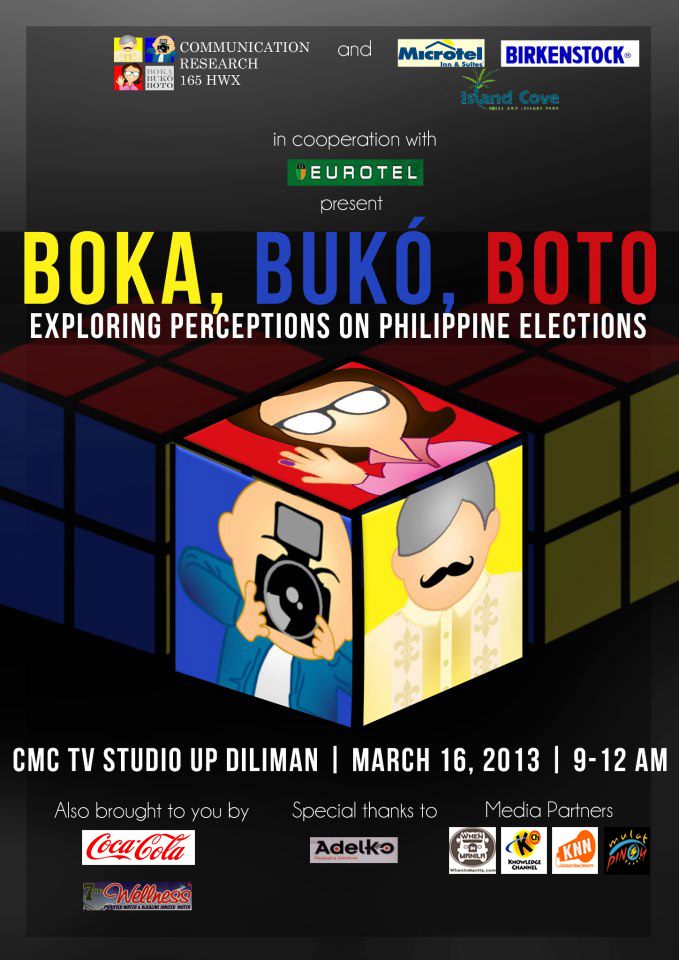
Boka, Bukó, Boto: Exploring Perceptions on Philippine Elections
By Nicai de Guzman
Forget the old saying that Filipino voters are plain “bobo.” Student researchers from University of the Philippines Diliman concluded that Juan de la Cruz has, in fact, certain standards for choosing their candidates.
In their study, entitled “Boka, Buko, Boto: Exploring Perceptions on Philippine Elections,” students from the Communication Research department categorized Filipino voters as objective, rational, relational, or any combination of these types.
Objective voters look at the profile of each candidate, including the candidate’s past government record, educational attainment, and achievements. Rational voters choose candidates who can benefit them the most, after weighing the pros and cons. Relational voters rely on their emotions and try to identify themselves with the candidates.
“Kahit Harvard graduate ka, hindi ka mananalo kung hindi ka nakapunta sa libing,” the study quoted one of their interviewees.
The study was conducted from December to January with over 900 registered voters as respondents. The respondents came from the different areas in the Philippines with the highest number of registered voters: La Union, Nueva Ecija, Benguet, Pampanga, Bulacan, NCR, Batangas, Laguna, Bicol, and several provinces from Visayas and Mindanao. Politicians, media practitioners, and political analysts were also interviewed.

A study on the different views of politicians, media practitioners, and voters on the Philippine Elections.
The politician, the voter, and the media
The study also explored the perceptions of voters on the role of politicians and media practitioners.
Voters see politicians in a negative light during election season, according to the study. However, voters also thought that “the system pushes [the politicians] to resort to undesirable measures in order to be elected.”
“Voters identify more with the character of the politicians and not with their party, platform, or experience as a politician,” the study also noted.
As for journalists covering the elections, the results of the study showed that voter respondents perceive them negatively. This is because of their observation that traditional media fails to balance its business interests and social responsibility.
“Journalists are hired as PRs (public relation officers) of candidates so siyempre may pera yun involved. What these journalist-turned-PR do is push or make the presence of this candidate more high-profile,” the study quoted one of their informants.
On the other hand, citizen journalism has been seen as a “step forward in the pursuit for a more proactive, critical, and creative public.”
Election campaign issues
These key players in elections – the voters, the politicians, and the media practitioners – all interact in the context of social issues that arise during the campaign period.
The issues that informants identified include epal or “mapapel” politicians, election-related violence, vote buying, negative media coverage, black propaganda, and political dynasties.
Because of the many issues, some voters are turned off and choose to abstain.
A new phenomenon in vote buying is also emerging, according to the informants. It is called the “negative right to vote.”
“Politicians bribe voters with money so that they will not vote, safeguarding a certain target of voters and not letting opponents come ahead in numbers,” stated the study.
Role of the youth in elections
As students who will be voting for the first time in May, the researchers said that working on the study gave them valuable insights about Philippine politics.
“Nakita namin na may mga politicians na sobrang tingin sa mga voters, and may mga voters na mababa tingin nila sa sarili nila,” said student Yanna Martin.
Martin, one of the leaders of the research group, also said that they plan to share the results of their studies to various communities or groups who may benefit from it.
“Ako first time voter ako, mas magiging informed ako, hindi lang ako, mas mahihighlight pa yung kagustuhan naming na dalhin [yung study] sa mga baranggays, sa mga communities,” she said.
COMELEC officer Marleen Rito also presented election guidelines for 2013, as well as a demonstration of the new PCOS machine. Watch here:
